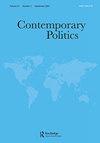What does the PJD learn from the outside? International factors and Islamist politics in Morocco
IF 2
3区 社会学
Q1 POLITICAL SCIENCE
引用次数: 2
Abstract
ABSTRACT This article explores the interaction between international and domestic arenas by studying the mechanisms through which domestic actors incorporate international factors into their strategic decisions. More specifically, it investigates whether and how the international context, regional examples, and third-party actors’ foreign policies impact the process of inclusion of the Islamist Party of Justice and Development (PJD) into Moroccan political institutions. The main contention is that the PJD selectively incorporates international experiences and insights. This article examines this dynamic by investigating the interplay of two main mechanisms, learning and adaptation, that connect internationally generated experiences and circumstances and the PJD’s strategic decisions. It focuses on three main phases of the PJD’s inclusion process: (a) the party’s first steps in the parliament (1996–1999), (b) the first years of the reign of Mohamed VI (1999–2010), and (c) the PJD’s electoral victories after the 2011 regional anti-authoritarian protests (since 2011–2012).PJD从外部学到了什么?国际因素与摩洛哥的伊斯兰政治
摘要本文通过研究国内行为者将国际因素纳入其战略决策的机制,探讨了国际和国内舞台之间的互动。更具体地说,它调查了国际背景、地区例子和第三方行为者的外交政策是否以及如何影响伊斯兰正义与发展党(PJD)融入摩洛哥政治机构的进程。主要论点是PJD选择性地结合了国际经验和见解。本文通过研究学习和适应这两种主要机制的相互作用来研究这一动态,这两种机制将国际产生的经验和环境与PJD的战略决策联系起来。它聚焦于PJD融入进程的三个主要阶段:(a)该党在议会的第一步(1996-1999年),(b)穆罕默德六世统治的第一年(1999-2000年),以及(c)PJD在2011年地区反独裁抗议活动后的选举胜利(自2011-2012年以来)。
本文章由计算机程序翻译,如有差异,请以英文原文为准。
求助全文
约1分钟内获得全文
求助全文

 求助内容:
求助内容: 应助结果提醒方式:
应助结果提醒方式:


